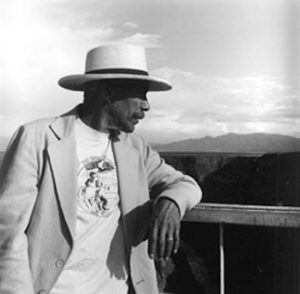
Charles Gordone, photo by Susan Kouyomjian Gordone
Charles Gordone was born on this date in 1925. He was a Black playwright, director, actor, and educator.
Charles Edward Fleming was born in Cleveland, Ohio, the son of William Fleming and Camille Morgan Fleming. With a racial heritage of African, Native American, and white-American descent, Gordone said he descended from "three races and five nationalities.” He grew up in Elkhart, Indiana, with two brothers, Stanley and Jack. In 1930, his mother married William L. Gordone, and they had a daughter, Leah Geraldine.
Gordone was educated at California State University, Los Angeles (B.A., 1952), New York University, and Columbia University. After spending time in the U.S. Air Force, Gordone became a waiter and an actor in New York City. He married Januita Barton, with whom he had two children, Stephen and Judy Ann. He later had two other children, Leah-Carla and David.
He performed in Jean Genet's “The Blacks " from 1961 to 1966, along with James Earl Jones, Maya Angelou, Cicely Tyson, and many other Black actors who went on to Hollywood.
In 1962, he co-founded the Committee for the Employment of Negro Performers and worked with the Ensemble Studio Theatre Actors Studio. In 1967, he worked at the Commission of Civil Disorders. In 1970, he became the first Black playwright to win a Pulitzer Prize for Drama. This was for the play 'No Place to Be Somebody.' He was also an instructor at Cell Block Theatre and Bordentown Detention Center in New Jersey from 1977 to 1978 and served as a judge for the Missouri Arts Council Playwriting Competition.
From 1978 to 1979, he was an instructor for the New School for Social Research in New York City. He said that acting as the valet in the play “The Blacks” changed his life, and this was when he began to write “No Place to Be Somebody.” Much of the play's materials came from his experience working in a tavern after he first came to New York. Initially staged off-Broadway, it struck a chord with audiences and critics for its actors' vivid characterizations of vibrant characters whose lives intersect in a New York City bar. Compared by several critics to the works of Eugene O'Neill, the story centers on a saloon keeper and pimp named Johnny Williams who tries to take over neighborhood rackets from the local syndicate.
During the last two decades of his life, Gordone directed plays and lectured in community theaters around the country. In the late 1980s, he voiced his opinion that minority actors should have more presence in realistic American plays. As a director, he cast Hispanic actors as migrant laborers in the production of “Of Mice and Men” and a Creole actor in “A Streetcar Named Desire.”
The first Black to win a Pulitzer Prize for Drama, Gordone devoted much of his professional life to pursuing multiracial American theater and racial unity. He earned many other awards and honors, such as the Obie Award for Best Actor ("Of Mice and Men," 1953), the Los Angeles Critics' Circle Award, the Drama Desk Award for “No Place to Be Somebody,” and the Vernon Rice Award in 1970.
Gordone began a nine-year teaching association with Texas A&M University in 1986. Known for his flamboyant wearing apparel, he remained a dramatic figure on the theater scene until his cancer death on November 13, 1995, in College Station, Texas.